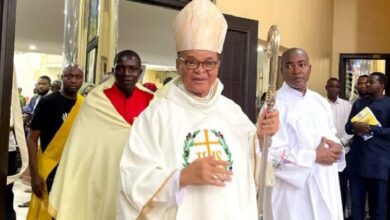Help reduce Streetism menace in Ghana – Catholic Nun
By Damian Avevor
In the wake of the high rate of Streetism in Ghana, Rev. Sr. Anthonia Orji, a Nigerian Catholic Nun of the Daughters of Sacred Passion (DSP) Congregation, working in Ghana, is urgently appealing to Churches, Corporate Organisations and the Government of Ghana to support the activities of Non-Governmental Organisations working to reduce streetism in the country.
In an interview with The Catholic Standard during the 21st Anniversary celebration of the Rays of Hope Centre (ROHC), a Church-based Organisation working to help rescue children on the street in Ashaiman, Tema, Madina, Ayikuma and their environs, she lamented that in spite of the good works of some NGOs, many children are still on the streets in the big cities and towns selling instead of being in School.
She noted that a trip through some principal streets of major cities- Accra, Kumasi, Takoradi, Koforidua, confirms how some children are neglected by their parents who are probably unemployed or financially handicapped.
Sr. Orji, who is the Educational Officer at the Welfare, Empowerment and Mobility (WEM) Centre, a branch of Rays of Hope Centre at Ayikuma, decried the situation where some Children live on the streets because they were probably born there.
She lamented how some are faced with School drop-out, child mortality, child labour, child trafficking, rape, prostitution and defilement and urged Ghanaians create a sense of belonging in street children.
She added that Christians have been endowed with the ability to perceive, appreciate and understand the situation of the vulnerable person, identify their needs, design needed services and facilitate the provision of requisite intervention to bring relief to them.
She appealed to parents and opinion leaders to jointly take steps to curb drug abuse, sexual promiscuity, teenage pregnancies, armed robbery, occultism and cyber fraud, among the youth, especially those on the street.
She noted that “if the youth, who are our future leaders resort to the get-rich-by-all means attitude, then the development of the nation is at great risk,” and appealed to stakeholders to support her Centre’s initiative in pursuing its goals of bringing hope to the vulnerable.
According to her, a number of children between the ages of three and 15 are homeless and roam the streets, a situation she described as alarming and which exposes children to hazardous lifestyles, including begging on the street and engaging in commercial sex work.
Sr. Orji feels there is the urgent need for a collective effort by individuals and corporate entities to support the Rays of Hope and other NGOs in their quest to take children from the streets.
“The Rays of Hope Centre has the vision of helping marginalised children on the streets to reintegrate into society and lead a happy and autonomous life. “We want to serve the children, their families, and the Ghanaian society as a whole,” she stated.
“We look for the most vulnerable children on the streets of Ashaiman, Tema, Madina and their environs, who are willing to seize the chance for a better life. We provide them with temporary shelter, where they can build trust and make friends. We teach them the basic rules to become decent, disciplined, and acceptable community members,” she added
Beneficiary children of the WEM Centre at Ayikuma live and stay there during School terms and come home for vacations to their parents and relatives. They all attend the St. Peter’s Catholic Basic School in Ayikuma. From Monday to Friday, they are engaged in 90 minutes of preps supervised by the Educational Officer, Staff members and volunteers.
On Fridays and Saturdays, they engage in extra curricula activities such as football and volley ball as well as practical skills training as they assist in the farm with farm work, in that case, they grow what they eat.
Provision in the 1992 Constitution of Ghana on the rights of children, led the Government to create the Ministry of Youth and Sports, the Ministry of Gender, Children and Social Protection, Department of Social Welfare, and Special Police Unit for Child Protection.
Additionally, Ghana has passed its own laws on child labour including the Children’s Act of 1998 and the Labour Act of 2003, both of which address child labour in detail. The Children’s Act bans all exploitative labour and echoes the 1992 Constitution’s prohibition by defining this type of labour as that which denies a child health, education or development. The Act additionally bans a number of child labour practices that it lists as “hazardous”.
